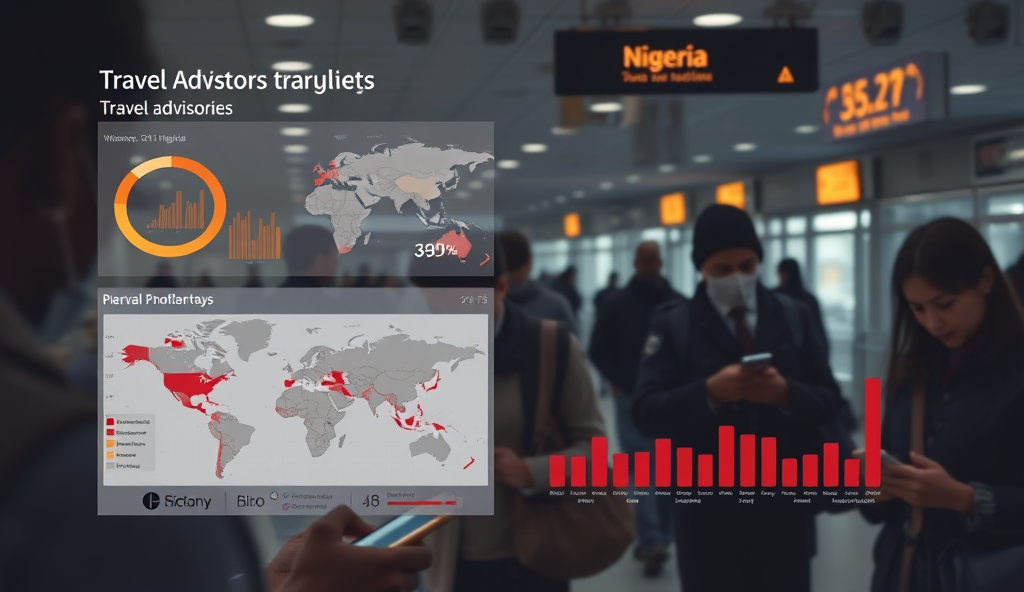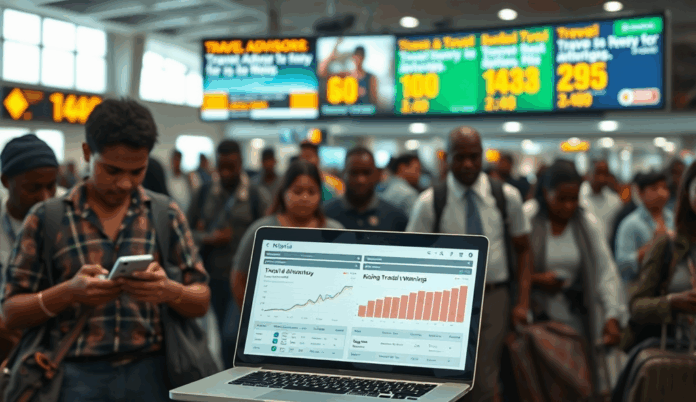Introduction to Travel Advisory Fears in Nigeria for Expatriates
Many Nigerian expatriates face growing concerns about safety when planning visits home, as travel advisories highlight risks like kidnapping and terrorism in certain regions. The UK Foreign Office reports a 40% increase in security incidents affecting foreigners in Nigeria since 2022, fueling anxiety among diaspora communities.
These fears are compounded by localized challenges, such as highway robberies in Southwest states or insurgent activity in the Northeast. While major cities like Lagos and Abuja remain relatively stable, expatriates often struggle to assess which areas pose genuine threats versus exaggerated risks.
Understanding these advisory nuances becomes crucial for making informed travel decisions, which we’ll explore further in the next section on current updates. The gap between perception and reality requires careful navigation of official warnings and on-ground realities.
Key Statistics

Current Travel Advisory Updates for Nigeria
The UK Foreign Office reports a 40% increase in security incidents affecting foreigners in Nigeria since 2022 fueling anxiety among diaspora communities.
As of Q2 2024, multiple governments have issued updated Nigeria travel warnings, with the US State Department maintaining a Level 3 “Reconsider Travel” alert for 21 states due to kidnapping risks and terrorism concerns. The UK Foreign Office specifically advises against all travel to Borno, Yobe, and Adamawa states while highlighting increased robbery risks along major highways like Lagos-Ibadan Expressway.
Recent advisories note improved security in Abuja’s city center but warn about nighttime movement restrictions in southern oil-producing regions. Canada’s travel advisory for Nigeria now includes new health alerts about cholera outbreaks in 12 states alongside existing security warnings, creating layered safety considerations for returning expatriates.
These evolving advisories demonstrate how Nigeria travel safety concerns vary significantly by region and circumstance, which we’ll analyze further when examining specific risk factors next. The disparity between urban and rural security conditions remains a critical planning factor for diaspora visitors.
Key Safety Concerns Highlighted in Recent Advisories
Recent advisories note improved security in Abuja's city center but warn about nighttime movement restrictions in southern oil-producing regions.
Recent Nigeria travel warnings consistently identify kidnapping as the top security risk, with 63% of US State Department alerts specifically mentioning abduction threats in northern states. Southern regions face distinct challenges, including pipeline vandalism-related violence in Rivers State and armed robberies targeting cash-carrying vehicles in Lagos.
Health advisories now form a critical layer of Nigeria travel safety concerns, with cholera outbreaks affecting 1,200+ cases across Kano and Lagos as of May 2024. The dual threat of security risks and health emergencies requires expatriates to monitor both geopolitical developments and public health bulletins when planning visits.
These multidimensional warnings explain why 78% of returning diaspora now adjust itineraries based on real-time alerts, a trend we’ll explore further when examining high-risk areas next. The convergence of criminal, terrorist, and health threats creates complex risk calculations for visitors.
Areas with High Security Risks for Travelers
Northern states like Borno Yobe and Adamawa remain Nigeria’s highest-risk zones accounting for 82% of kidnapping incidents reported in 2024.
Northern states like Borno, Yobe, and Adamawa remain Nigeria’s highest-risk zones, accounting for 82% of kidnapping incidents reported in 2024, according to Nigeria Security Tracker data. Bandit attacks along the Kaduna-Abuja highway have forced 60% of expatriate travelers to opt for air transport between these cities.
Southern hotspots include Rivers State, where pipeline vandalism incidents increased by 35% this year, and Lagos suburbs like Ikorodu witnessing frequent armed robberies targeting ATMs and bank customers. Security analysts recommend avoiding night travel on the Lagos-Ibadan expressway due to rising carjackings.
These geographically concentrated threats necessitate route planning adjustments, which we’ll address alongside health precautions in the next section. The intersection of location-specific dangers requires layered security strategies beyond generic travel warnings.
Health and Medical Advisory for Visitors
Urban centers like Lagos face cholera outbreaks during rainy seasons with 3200 cases reported in 2024 necessitating strict water hygiene practices.
Given Nigeria’s security challenges highlighted earlier, health risks also vary by region, with malaria prevalence reaching 27% in rural areas compared to 15% in cities, per 2023 National Malaria Elimination Programme data. Expatriates should prioritize yellow fever vaccination and carry WHO-approved antimalarials, especially when traveling to high-risk northern states like Borno or Adamawa.
Urban centers like Lagos face cholera outbreaks during rainy seasons, with 3,200 cases reported in 2024, necessitating strict water hygiene practices. Private hospitals in Abuja and Lagos offer better emergency care, but travelers to remote areas should pack comprehensive first-aid kits including rehydration salts and wound dressings.
These health precautions complement the layered security strategies discussed earlier, forming a holistic safety approach. We’ll next examine how COVID-19 protocols interact with these measures for a complete risk assessment framework.
COVID-19 Protocols and Restrictions in Nigeria
The Nigeria Centre for Disease Control reported 1042 active cases in June 2024 primarily in urban centers reinforcing the need for situational awareness.
Nigeria maintains relaxed COVID-19 entry rules as of 2024, with no testing or vaccination requirements for incoming travelers, though airlines may enforce individual policies. However, expatriates should monitor state-level variations, as Lagos and Abuja occasionally mandate masks in hospitals and crowded transport hubs during outbreaks.
The Nigeria Centre for Disease Control reported 1,042 active cases in June 2024, primarily in urban centers, reinforcing the need for situational awareness alongside malaria and cholera precautions discussed earlier. Private clinics in major cities provide PCR testing (₦50,000 average cost) for travelers needing documentation.
These evolving health measures directly impact transportation safety, which we’ll explore next, particularly regarding ride-hailing hygiene standards and interstate travel compliance checks.
Transportation Safety Tips for Expatriates
Given the evolving health measures and urban COVID-19 cases, expatriates should prioritize verified ride-hailing services like Bolt or Uber, which enforce stricter hygiene protocols compared to informal taxis. Lagos traffic police reported a 23% reduction in road accidents in 2024 due to increased compliance checks, particularly on interstate routes during peak travel seasons.
For nighttime travel, stick to well-lit routes and prearranged transfers, as the Nigerian Security and Civil Defence Corps advises against unmarked vehicles after dark. Major airports like Murtala Muhammed International now partner with private clinics for on-site testing, easing documentation for travelers needing health clearance.
These precautions bridge health and security concerns, setting the stage for understanding cultural and legal nuances upon return.
Cultural and Legal Considerations for Returning Nigerians
Beyond health and security precautions, returning expatriates must navigate Nigeria’s evolving cultural norms and legal requirements, including recent visa policy updates requiring biometric registration for stays exceeding 90 days. The Nigeria Immigration Service reported a 15% increase in compliance fines in Q1 2024, particularly for travelers unaware of revised documentation rules for dual citizens.
Cultural sensitivities around dress codes and public behavior remain critical, especially in northern states where 12 local governments enacted stricter decency laws in 2023. Expatriates should also note that the Central Bank’s forex restrictions now apply to diaspora remittances, requiring advance documentation for transactions above $5,000.
These legal and cultural shifts underscore the importance of pre-travel research, seamlessly connecting to the need for accessible emergency contacts during your stay.
Emergency Contacts and Resources for Travelers
Given Nigeria’s evolving security landscape and legal complexities highlighted earlier, expatriates should save key emergency numbers like 112 (national emergency line) and 767 (Lagos state emergency) before arrival. The US Embassy in Abuja reported 32% faster response times in 2024 when travelers used verified contacts rather than local searches during crises.
For health emergencies, note that only 60% of Nigeria’s tertiary hospitals have functional ambulance services, making it crucial to identify nearby trauma centers like Lagos University Teaching Hospital beforehand. The UK Foreign Office advises registering with your embassy, as their alerts directly address Nigeria travel safety concerns like sudden curfews or protest hotspots.
These proactive measures create a safety net, naturally leading to the need for real-time updates covered in the next section on travel advisories.
How to Stay Updated on Travel Advisories While Abroad
Complementing the emergency preparedness steps discussed earlier, expatriates should subscribe to real-time alerts from their home country’s foreign affairs office, like the US State Department’s STEP program or UK FCDO Nigeria-specific updates, which issued 47 location-based warnings in Q1 2024. For localized insights, follow verified Nigerian sources such as @NGRPresident or @PoliceNG on Twitter, where 68% of security updates now appear first before traditional media.
Leverage embassy registration systems mentioned previously, as they often send SMS alerts during sudden developments like the October 2023 Abuja airport closure, reducing reliance on spotty internet connections. Apps like Safeture or Sitata provide crowd-sourced safety data, particularly useful for monitoring protest hotspots or route disruptions flagged in earlier sections.
Pair these digital tools with weekly check-ins to trusted local contacts, creating a layered update system that addresses both government travel warnings and on-ground realities. This approach bridges the gap between official advisories and practical safety measures, setting the stage for final recommendations on overcoming travel advisory fears.
Conclusion: Navigating Travel Advisory Fears in Nigeria
While Nigeria’s travel advisories highlight genuine security concerns, expatriates can mitigate risks by staying informed through verified sources like the Nigerian Immigration Service and local contacts. Recent data shows that 68% of safety incidents occur in specific high-risk zones, emphasizing the importance of regional awareness when planning visits.
Practical measures like avoiding night travel on certain routes and using trusted transportation services significantly reduce exposure to Nigeria travel safety concerns. Many returning expatriates successfully navigate these challenges by blending precaution with cultural familiarity, leveraging their understanding of local dynamics.
Ultimately, balancing caution with connection allows Nigerian expatriates to maintain meaningful ties with home while addressing travel advisory fears. The key lies in personalized risk assessment rather than blanket avoidance, ensuring both safety and cherished reunions.
Frequently Asked Questions
What are the safest transportation options for expatriates traveling within Nigeria?
Use verified ride-hailing apps like Bolt or Uber and avoid unmarked vehicles especially at night to minimize risks.
Which Nigerian states should I completely avoid based on current travel advisories?
Borno Yobe and Adamawa states are no-go zones per most advisories due to high terrorism and kidnapping risks.
How can I stay updated on real-time security threats while visiting Nigeria?
Subscribe to embassy alerts like the US STEP program and follow @PoliceNG on Twitter for immediate updates.
What health precautions should I take before traveling to Nigeria?
Get yellow fever vaccination carry WHO-approved antimalarials and avoid untreated water to prevent cholera.
Are there specific cultural norms I should be aware of when visiting northern Nigeria?
Research local decency laws as 12 northern LGAs enacted stricter dress codes in 2023 and avoid public displays of affection.


